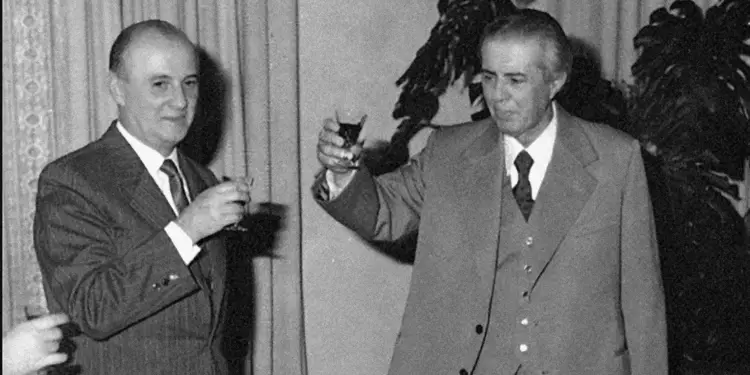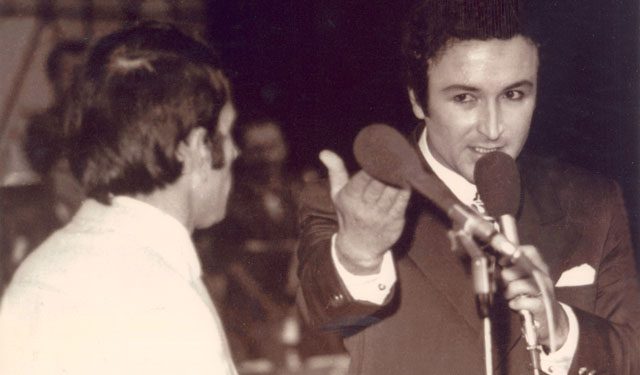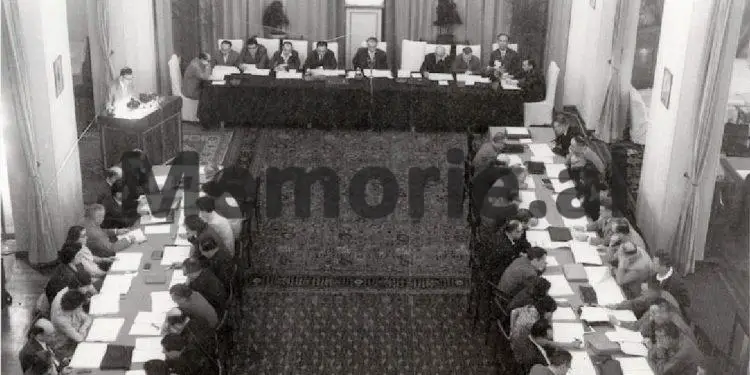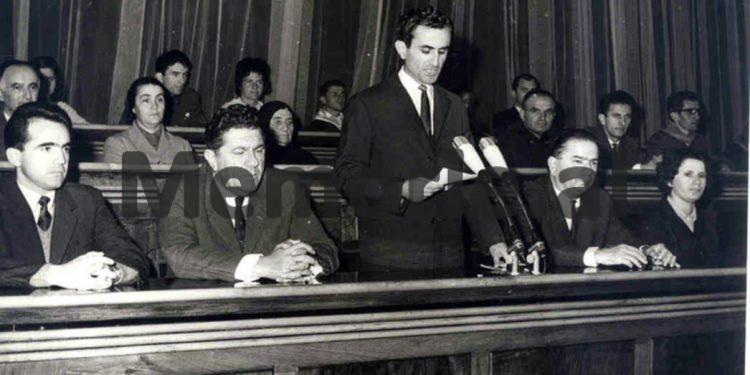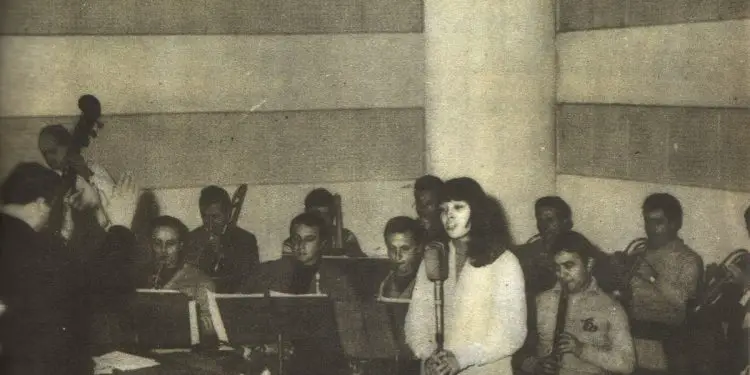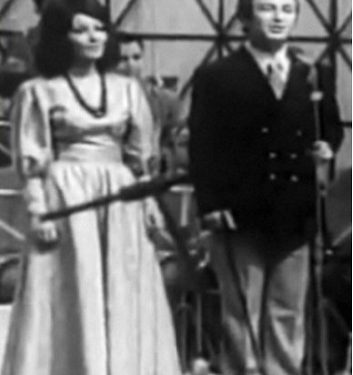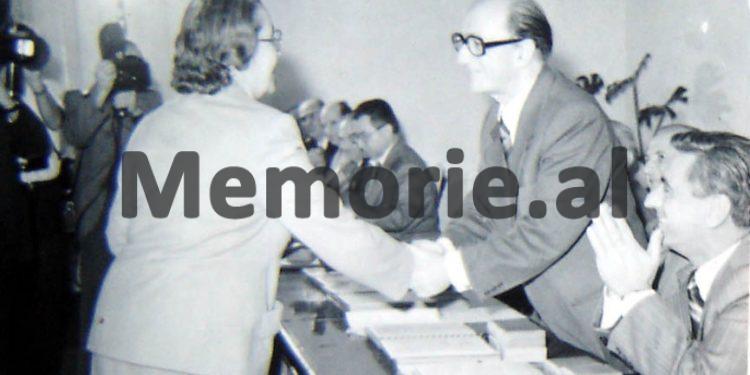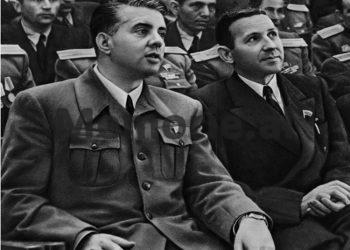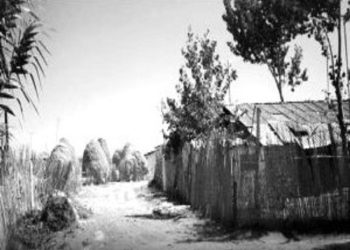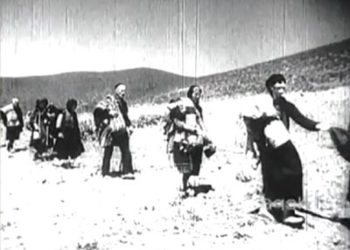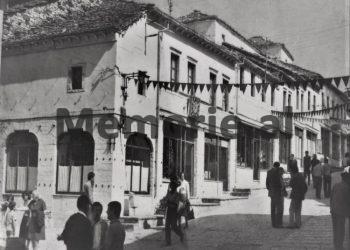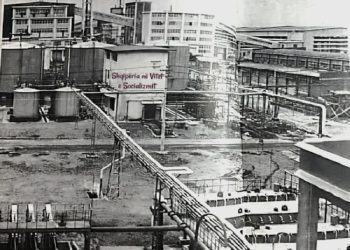From Skifter Këllici
Part eight
Memorie.al / It is the fourth time that I am writing about the 11th National Song Festival on Albanian Radio Television, (December 22-25, 1972), as much as I wrote some time ago about the Tirana Conference, (16- April 20, 1956). And this time for the same reason: for the lack of historical accuracy of some events related to this festival, which Ramiz Alia, the former first secretary of PPSh, after the death of Enver Hoxha, describes in the book his last “My Life” (2010), although there are objective, honest statements in it, especially when he testifies about the serious mistakes that led to the failure of the communist system in Albania, led by Enver Hoxha, for which he apologizes. But in the description of his figure, Ramiz Alia is often contradictory, especially in the chapter; “The fight against liberalism”, where it stops at the 11th Song Festival on Albanian Radio and Television (December 22-25, 1972).
Continues from last issue
Ramiz Alia on the knife edge…?!
In his book “My Life”, after showing that the report in the 4th Plenum was held by Enver Hoxha himself, because he could not be a referent, because he had to account for the mistakes that had happened in the sectors he led, as he then explains that he had made self-criticism, that he had lacked the necessary vigilance, that he had underestimated the risk of influences from foreign ideology… and for these mistakes the Fourth Plenum had criticized and punished him with “remarks on the registration card of the Party”, Ramiz Alia continues:
“Several times I have been asked how it is possible that I ‘escaped’ with only that, that is, without being included in the ‘list’ of enemies of the Party in the 4th Plenum! I must say that the criticisms which could rank me in the hostile groups were made in the 4th Plenum and the initiator was Mehmet Shehu…! But this thing was opposed especially by Enver Hoxha…! He knew me very well, especially since 1960, when the open war against Khrushchev’s revisionism began. As a result, Enveri knew my thoughts very well and had no way to suspect, let alone believe, any other person, who had the intention of implicating me in any “hostile” or revisionist activity! (page 265).
This is how it is: precisely because he had this faith in Ramiz Ali, Enver Hoxha excluded him from the “list of enemies”. But he had found the 11th Festival, as a trigger to launch the barbaric attack on art and culture, to let him understand that; public opinion, the people, anyone, had to be more and more subjugated, because, in the first case, he would discover “other enemies” and punish them mercilessly, as happened afterwards.
He had forgotten the orders he had expressed to Agim Mero in 1971, that is, about the care that should be shown to the youth, which I have mentioned above. (Not only that, but in the reprint of his complete works, this meeting has been removed, as well as all the evaluations he had made of Mehmet Shehu after his murder, or suicide, etc…).
But there was another and even greater reason, that Enver Hoxha did not condemn Ramiz Ali. “It is said, – he writes in the book “My Life”, – that Enver had chosen me as his deputy, that’s why he protected me. I don’t believe this was the reason, because it is universally known that when the war against “liberalism” began (the beginning of 1973), Mehmet Shehu and Hysni Kapo were known as the main candidates and successors of Enver…! It is also said that; could this be influenced by my association with Nexhmje, or by Krushkja, since my niece is married to Ilir, Enver’s son. But I don’t believe this, that both Enver and Nexhmija were not ‘repelled’ in their decisions even by cousins and relatives, we remember the case of Bahri Omar, (brother-in-law of the dictator, who shot him in 1945, my note, S.K. ), nor from societies and friendships”. (page 265).
No, it was precisely the above reasons that Enver Hoxha did not include Ramiz Ali in the “list” of enemies. He did the opposite of what Taras Bulba did, in Gogol’s beautiful novella, who killed his son for treason, or Mateo Falcone, in the story of the same title, by Prosper Merime, who killed his infant son, also for treason. For treason or for violating the “high ideals” of the Party, Ramiz Alia should also be included in this list, but Enver Hoxha avoided this decision. So it was not “principled”. (I underline on this occasion that, like many, many of my friends at the time, I never wanted Ramiz Alia to suffer the fate of those condemned by the dictator).
I am convinced that, if Enver Hoxha had condemned Ramiz Ali, as he condemned Todi Lubonja, Fadil Paçram and others, on the pages of the book “My Life”, we would find another Enver-executioner, bloodthirsty criminal, dictator described. peerless, as he really was. Todi Lubonja, upon returning to Lezhë, was also dismissed from the position of director of the Water Company, to become a normist, worker and was imprisoned and accused of liberal-opportunistic aesthetic views and tastes, on July 27. was sentenced to 15 years in prison. After spending 13 years in the terrible prison of Burrel, he was released in June 1987 and interned in the village of Malecaj in Lezha, and only at the end of 1990, he was able to return to Tirana.
Fadil Paçrami had a worse fate. After spending about 17 years in the prison of Burrel and the last year in the prison of Greater Kosovo, near Elbasan, he was released from prison on March 17, 1991, two weeks before the pluralistic elections. Strange! Ramiz Alia, who, just as he knew Lubonja, also knew Paçram, especially since he was also from Shkodra, did not dare that these two, condemned simply for the sadistic tendencies of Enver Hoxha, which he was about to have suffer his back, to release them from prison first. Even the great writer Kadare, as described in his book, “From one December to another”, a few years after the death of the dictator, asked him that Todi Lubonja no longer stay in prison. But the “heir” of Hoxha, even after his death, was afraid that he would rise from the grave and curse him!
However, in the book “My Life”, published 36 years after the conviction of Todi Lubonja and Fadil Paçram, Ramiz Alia expresses deep and sincere regret, when he writes: “Personally, I suffered the punishment of these comrades morally. I had a close relationship with Todd before the war, while after the war, both of us, as well as our wives, made the relationship with each other even closer…! The severe punishment he suffered and especially his and his son’s imprisonment, the exile of Liria, (his wife) and the whole family (sister and brother), spiritually I have never approved. I remained silent, obeying the line and discipline of the Party…”! (page 266).
No, we are not talking here about obedience to “Party discipline”, but it was fear that gripped not only Ramiz Ali, but every member of the Political Bureau, starting with Hysni Kapo, or the “iron man” Mehmet Shehu, who surely they considered these punishments obscurantist, but who did not have the courage to openly say to the Hitler dictator: “Where is your mule leading you, Enver…”?! Even this fear of the shadow of Enver Hoxha, who died in 1985, by his wife, Nejhmija, continued even after that, as Ramiz Alia in his book continues like this: “Even when I was at the head of the Party, I did not help him Todd. I feel the weight of my guilt…”! (Yes there).
Delayed repentance…!
Moreover, Ramiz Alia also protects Enver Hoxha, when after the 11th Festival, he took such criminal measures. He emphasizes once again in the pages of his book that; Enver’s “sectarian and harsh attitude” was dictated “by the instinct of self-defense”, that it was a sign from the Titists and Koci Xoxe, who accused him of opportunism, sectarianism, with the aim of eliminating him, that the circle of enemies who wanted his head of him, it was added, “especially after the break with the Soviet Union”, that “even the rapprochement of China with the Americans…” may have influenced his condition! (“My life”, page 263).
So, in other words, just like after the Tirana Conference (1956), when Enver Hoxha personally condemned dozens and dozens of communists who demanded in this open party assembly, democratic developments and the condemnation of the cult of Stalin, as had happened at the 20th Congress of the Communist Party of the Soviet Union, i.e. the condemnation of Enver Hoxha’s own personality cult, and after the 11th Festival the dictator undertook this attack, influenced by the above factors. Ramiz Alia then defended Enver Hoxha, calling his actions “some paranoia, justified in my opinion”, (page 199 of his work “My Life”).
This time for his actions after the 11th Festival, as we saw, he does not use the word paranoid, but implies it, because Enver was driven “by the instinct of self-defense”. And in fact, without further ado, the whole opinion spread since then among the people, and I believe among other bureaucrats, was the opinion of Ramiz Ali, that is, that the actions of Enver Hoxha were the actions of a man who suffers from paranoia. And to be more convinced that Enver Hoxha was paranoid, that is, as I explained in the first part of this dossier, a man who suffers from a sense of persecution, or delusions of grandeur, which cause him absurd convictions, which do not coincide with reality, let’s continue with the other punishments he undertook after the IVth Plenum of the Central Committee of the Party, in June 1973.
Terror on writers and artists!
From the beginning of October 1974, Mihal Luarasi, director of the 11th Festival, who worked at a construction site in Ballsh, was also imprisoned. He was released from prison in early 1983 and worked as a painter. Minush Jero, the author of the drama “Njollat e murrme”, which Luarasi had put on the stage of the Korça theater in 1969, and the singer of this festival, Sherif Merdani, also suffered his fate. Accusation – of “singing degenerate western songs”. All these, as we are seeing step by step, have their origins in the festival, songs broadcast on RTSh.
However, let’s make a guess: It’s the last days of December 1972. So, after the festival. Enver Hoxha is in the office. One of the secretaries shyly enters the office and leaves some materials on the table. Enver Hoxha browses them. It’s the latest news from news agencies. In a news of the Yugoslav agency, TANJUG, it is written that; “Albania shows signs of opening up towards the west. This was proven by the last song festival in RTSh, in which, unlike other festivals, the singers not only sang rhythmic songs of the Italian model, but also appeared in the latest fashion clothes…”!
In another news of the Italian agency, ANSA, it is emphasized that the last song festival in Tirana, with two presenters of the program, with the big orchestra and two small orchestras, with the jury in the hall and the juries in some other cities of Albania, it was a beautiful copy of the San Remo Festival, which proves how much Italian TV has influenced the elaboration of modern tastes among Albanians. Further, a report from the Ministry of Internal Affairs: “Sources from our State Security bodies inform that in many cities, the songs of the 11th Festival, recorded on tape recorders, are even sung in the rooms of houses, where young people influenced by them, dance and sing in the American way…”! Enver Hoxha pales, clenches his teeth and decides to take action, as he actually did…!
To be honest, if this had happened, the dictator could have had the right to revolt and condemn the 11th Festival. But none of these predictions happened. When I related the events of the 11th Festival and its other consequences, which I will write about below, to some of my Italian-American friends who live in Boston, they were amazed and added that these, could only occur in the period of the medieval inquisition. But it is known that “Goliath” Enver Hoxha did not limit himself to the barbaric blow he gave to the 11th Festival. He turned his sling in other fields of art!
“In literature and arts, – it was emphasized in the Party materials, dedicated to the 4th Plenum, – the enemy elements, under the guise of the war against conservatism, had tried to open the way for liberalism, to remove our literature and arts from the path of socialist realism. At the center of the strike, they had the principle of party leadership in literature and the arts. In the plenum, the Union of Writers and Artists was criticized, some of whose leaders had allowed the spread of foreign concepts and theorizing about our literature and arts. The Ministry of Education and Culture was also responsible for this, which had underestimated the danger of liberalism and had retreated to liberal pressures. (The 4th Plenum of the Central Committee of the PPSh, June 1973, “Albanian Encyclopedic Dictionary”, page 847, 1985).
As a result, the chairman of the League of Writers and Artists, Dhimitër Shuteriqi, was released from office, its secretary, Vilson Kilica, left with a heavy sentence, the editor-in-chief of “Drita”, Ibrahim Uruçi, ended up being exiled to Memaliaj, where he died in misery, circulated its editor, Moikom Zeqo. The editor-in-chief and well-known critic, Dalan Shapllo, editors Gjergj Zheji, Andon Kuqali, Sulejman Mato left the magazine “Nëntori”; from the Publishing House, “Naim Frashëri”, the editors Dilaver Dilaveri, Rinush Idrizi, Aristidh Ristani, who had allowed the publication of foreign works, with distorted ideo-aesthetic views, circulated.
This campaign continued with circulations and other punishments of writers, such as; Teodor Laco, Pëlumb Kulla, Leka Bungo, etc.! Surprisingly, the well-known poet, Xhevahir Spahiu, who was twice openly criticized by Enver Hoxha himself, for influences on his creativity, from Sartre’s “reactionary” philosophy, escaped unpunished. Then, the consequences became tragic: for their abstractionist and surrealist tendencies in the visual arts, the painters Edison Gjergo and Ali Oseku, the writer Zydi Morava, the poets Jorgo Bllaci, Frederik Reshpja, Visar Zhiti, were arrested and sentenced to long prison terms. Daut Gumeni, Uran Kostreci, the director and playwright, Kujtim Spahivogli and later the architect and painter Maks Velo.
The volume of the famous poet Fatos Arapi, “Give me a name”, due to ideological errors, was not published and he was sentenced to move from the State University of Tirana, where he was a lecturer-teacher, to an evening school. It was not allowed to be published in the newspaper “Drita” and it was directly condemned by Enver Hoxha, the poem “Red Pashallarët” by Ismalil Kadare, who decided to spend several months in the villages of Myzeqe. And Abdurrahim Muftiu, secretary of the collegium of this newspaper, who had approved this poem to be published, was fired. The climax of the absurd punishments came with the shooting of two young poets from Librazhdi, Genc Leka and Vilson Blloshmi…!
It is strange how Ramiz Alia does not mention in his book even one of the above names of creators who were sentenced after the 4th Plenum of the Central Committee of the PPSh, punishments that were nothing but a continuation of punishments others that this despot and communist caste had undertaken against writers since 1945: Died from torture in prison – writers, Catholic priests, Vincens Prenushi, Bernardin Palaj; shot – Lazër Shantoja, Anton Arapi, Trifon Xhagjika, Fadil Kokomani, Vangjel Lezho; prisoner, Ethem Haxhiademi, Gjergj Bubani, Arshi Pipa, Mitrush Kuteli, Mustafa Greblleshi, Ibrahim Dalliu, Kasem Trebeshina, Mehmet Myftiu, Bedri Myftari, Kin Dushi…! Memorie.al
The next issue follows




